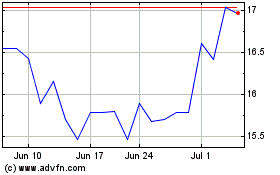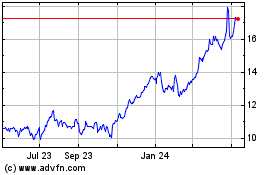By Jenny Strasburg and Max Colchester
Just a few years ago, Europe's banks managed to stagger out of
crisis brought on by the Continent's debt woes. Britain's looming
exit from the European Union, analysts and investors fear, could
push them back in.
A wide swath of European financial institutions are at risk:
Hobbled behemoths like Deutsche Bank AG and Credit Suisse Group AG
that are limping through difficult turnarounds, clusters of
regional banks pressured by negative interest rates, and banks
across Europe's weak periphery that are reeling under piles of bad
loans.
Still wounded from the eurozone debt crisis, European banks need
investor confidence and steady economic growth to prosper. Brexit
risks both.
Perhaps most acutely, Britain's breakaway calls into question
the durability of the European Union and the euro. All of a sudden,
the prospects of Europe's political framework disintegrating at its
core, considered far-fetched just days ago, have edged up.
"This event could be discombobulating for eurozone banks if the
market fears tail risk of a eurozone break up," Huw van Steenis,
Morgan Stanley's lead European banking analyst, wrote in a note
Friday.
And the medicine may not help.
The market could be expecting central banks to step in with
lower interest rates or debt buybacks, Mr. van Steenis added. But
cuts to interest rates, already negative in many European markets,
bode worse business conditions for lenders, not better.
That helps explain why investors sold European bank stocks
somewhat indiscriminately Friday. Spain's Bankia SA dropped 21% and
Italy's UniCredit SpA 24%. Yet France's BNP Paribas, seen as one of
Europe's stronger, better-run banks, also fell 17%.
Many banks will face questions about how much work they have
done in the years since the eurozone crisis to raise additional
capital, reduce their use of borrowed money and shed risky assets.
Investors have taken a dim view: Valuations of scores of banks, big
and small, are very low.
Even if European policy makers managed to stamp out existential
concerns, the economy is likely to take a hit. Ratings firm
Standard & Poor's Global Ratings says "Brexit" could knock 0.5
percentage point off the entire eurozone's economic growth next
year. That is a considerable amount: Before the Brexit vote, the
European Commission had forecast growth to be 1.8% in 2017.
Growth is vital to banks' viability equations. In countries like
Italy and Greece, where bad loans are endemic, banks need their
troubled borrowers to hang on so they can repay their debts. That
is vastly harder if the economy slumps, house prices fall and
unemployment rises.
Brexit further fuels concerns that European banks' capital
cushions are too thin. Germany's biggest lender, Deutsche Bank, and
Swiss rival Credit Suisse have pledged to boost capital levels by
selling assets, cutting costs and hoarding earnings.
But a slowdown in deals, and companies' anticipated reluctance
to issue new shares and debt, could punch holes in their
investment-banking and trading-profit engines. Deutsche Bank and
Credit Suisse shares have declined 41% and 48% this year,
respectively.
That compares with a 22% year-to-date decline in the Stoxx
Europe 600 Banks index. The index fell 14.5% on Friday.
While a 2008 style funding crunch seems unlikely, British banks
face a wave of longer-term uncertainty.
The Brexit outcome raises questions about whether Lloyds Banking
Group PLC and Royal Bank of Scotland Group PLC will keep their
headquarters in Scotland. Scottish leaders have said they are
pushing for independence from the U.K. to remain in the EU.
Shares of London-based Barclays PLC fell 30% Friday morning
before ending the day down around 18%.
On Friday, Citigroup Inc. banking analysts led by Andrew Coombs
downgraded Barclays to "sell" from their previous "buy" rating,
forecasting sharply higher funding costs and lower profit.
One concern is how Barclays and other banks with big
London-based trading divisions might navigate regulatory agreements
that require a legal base in the EU. That question, which involves
what are known as "passporting" rights for securities trading, is
central to broader worries about London's ability to maintain its
massive financial-services workforce.
"Given that this is going to be a slow-burning downturn, do
regulators force banks to raise capital now, or wait for six
months?" said Chirantan Barua, a banks analyst at Bernstein
Research.
London-based investment-banking operations will likely again
swing the ax in coming months, potentially eliminating thousands
more jobs, Mr. Barua said.
The mood on London's trading floors and among its investment
bankers is downbeat, bank employees said. "My team has a lot of
different nationalities, and they are worrying about their jobs and
their ability to stay in the country," said a senior banker at an
American investment bank in London.
Italy's banking sector has been roiled by soured loans,
insufficient capital and management upheaval. Analysts have warned
that the country's biggest bank, UniCredit, is ill-positioned to
manage Brexit fallout.
UniCredit shares have lost 47% this year as investors fretted
about its thin capital buffer. Its embattled chief executive,
Federico Ghizzoni, agreed to step down in late May, but the bank
has so far failed to find a successor.
The Brexit vote is creating "a lot of uncertainties which will
compound the issues of Italian and Spanish banks," said Filippo
Alloatti, a Hermes Credit senior analyst in London.
Spain's biggest lender, Banco Santander SA, relies on mortgages
and other products it sells in the U.K. to generate about a quarter
of its total net profit.
On Friday, Santander dragged Spain's benchmark stock index to
its biggest one-day drop ever. Shares of the bank fell 20%.
Executive Chairman Ana Botín, who ran the British unit before
taking the helm of Santander, tried to reassure investors, noting
in a statement that the bank's focus on retail banking provides
stability. That was a nod to investor concerns that investment
banks in particular could be hard hit by post-Brexit market
volatility.
Santander's commitment "to British businesses, customers and our
people remains as strong as ever," she said.
But J.P. Morgan European bank analyst Kian Abouhossein included
Santander on Friday in his list of "most-impacted banks" exposed to
potential U.K. credit weakness.
In Portugal, analysts say while banks have almost no direct
exposure to the U.K., they will suffer from investors' risk
aversion at a time when the system is already struggling with low
profitability and a big portfolio of souring loans.
Analysts say banks are undercapitalized. Portugal's economy is
grappling with low growth and high levels of debt weighing down the
government and Portuguese companies. Lenders have also invested in
Portuguese government debt, which stands to lose value amid the
uncertainty.
--Giovanni Legorano, Patricia Kowsmann and Jeannette Neumann
contributed to this article.
(END) Dow Jones Newswires
June 26, 2016 16:47 ET (20:47 GMT)
Copyright (c) 2016 Dow Jones & Company, Inc.
Deutsche Bank Aktiengese... (NYSE:DB)
Historical Stock Chart
From Mar 2024 to Apr 2024

Deutsche Bank Aktiengese... (NYSE:DB)
Historical Stock Chart
From Apr 2023 to Apr 2024
